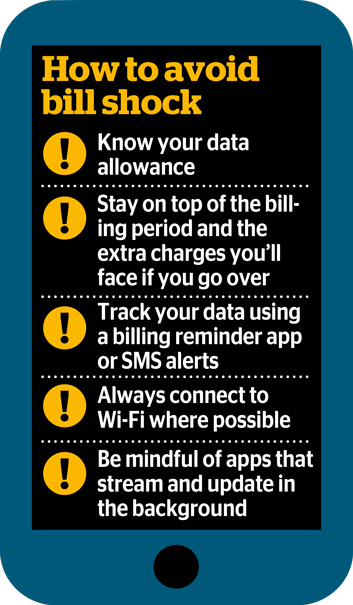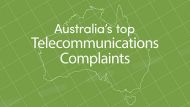The first time Harriet Farkash went over her $89-a-month phone bill she kicked herself, but assumed it was merely "a busy month" and moved on.
Then it happened again, and again, and again.
More NSW News Videos
Australia's telco complaints by the numbers
The Telecommunications Industry Ombudsman reveals Australian's biggest NBN gripes and which mobile network lifted its game in 2015-16.
By the end of last year the freelance writer had paid an extra $1000 in excess mobile data charges."I wasn't sure what was causing it, before I realised the main culprit was probably [messaging app] WhatsApp," Ms Farkash, 31, said.
"I'm in a few group chats with friends. I worked out that one thread would have around 3000 messages a month ... so it was really chewing into my data."
A recent survey by comparison site finder.com.au has found Australians have a high tolerance for mobile bill shock, with $214 the average amount that shocks consumers.
For a typical mobile phone plan Australians pay $47.70 a month, on average.
According to the research, one in four respondents have experienced bill shock, and of those, almost one third have received a bill of $200 or more.
Unsurprisingly, Generation Y is the age group most commonly hit.

After Ms Farkash received multiple bills for $300 or more, she approached her provider seeking an alternative plan to better suit her usage.
"I went onto a $40-a-month plan, where I get 10 gigabytes of data and I have not gone over once. I watch Netflix on my phone, use Spotify, and I don't think about it at all."

In December last year, the Australia Communications and Media Authority revealed a decline in the incidence of consumers receiving unexpectedly high bills since 2013; from 33 per cent to 19 per cent.
For product bundles (mobile, broadband, landline) in the same period it has fallen from 26 to 10 per cent.
ACMA also found the average extra amount consumers were paying for unexpectedly high bills has reduced from $94 to $60 in the past four years. 
"Fewer [consumers] are experiencing unexpectedly high bills, and they are making better use of spend management tools to monitor and track their expenditure,' said acting ACMA Chairman, Richard Bean.
He said consumers were budgeting through SMS alerts, usage of which has increased from 67 to 78 per cent since 2013.
Alex Kidman, tech expert at finder.com.au, said bill shock was happening less, because the value of services had improved, but he maintained there were still ways consumers could "blow their cap".
"Our figures point to the main culprit being data usage, although roaming is still a big one," he said.
"While it is easy to go over your data limit, phone providers these days are obliged to message you when you're close to reaching your data usage cap."
The Australian Communications Consumer Action Network said bill shock was declining, however it had recently received an increase in inquiries about mobile premium services and direct carrier billing.
"Often the consumer has inadvertently signed up for a service ... by accidentally clicking on an advertisement on a website. These can ... accumulate to large amounts of money if the consumer does not unsubscribe and request a refund," an ACCAN spokesman said.
Interact with us on Facebook - Savvy Consumer Latest consumer news

















